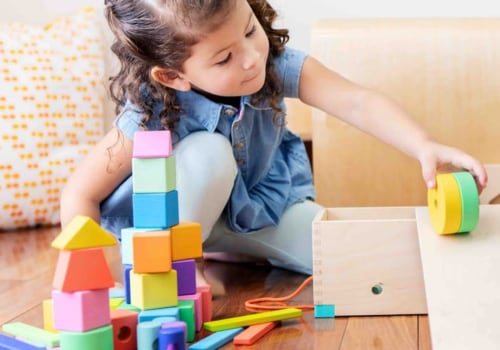As an expert in early childhood development, I have seen firsthand the impact that toys can have on a child's growth and learning. That's why I am a strong advocate for wooden Montessori toys, which offer a more natural and sustainable alternative to plastic toys. Montessori education is based on the philosophy that children learn best through hands-on experiences and exploration. This approach also extends to the toys and materials used in a Montessori classroom or home environment. While plastic toys may seem convenient and affordable, there are many benefits to choosing wooden toys instead.
The Importance of Natural Materials
One of the main principles of Montessori education is to bring children closer to nature.This includes using natural materials in their learning environment, including toys.
Wooden
toys are not only aesthetically pleasing, but they also provide a sensory experience for children. The texture, weight, and smell of wood can stimulate a child's senses and enhance their learning experience. In contrast, plastic toys are often mass-produced and lack the same sensory appeal. They can also be harmful to the environment, as they are not biodegradable and contribute to pollution and waste.Promoting Creativity and Imagination
Another advantage of wooden Montessori toys is that they encourage open-ended play.These types of toys do not have a specific purpose or set of instructions, allowing children to use their imagination and creativity to play with them in different ways. This type of play is essential for a child's development as it promotes problem-solving skills, critical thinking, and self-expression. Plastic toys, on the other hand, often come with a predetermined purpose or function, limiting a child's ability to explore and create.
Durability and Longevity
One of the most significant drawbacks of plastic toys is their short lifespan. They are often easily breakable and can quickly lose their appeal, leading to them being discarded and replaced. This not only contributes to waste but can also be costly for parents.Wooden
Montessori toys, on the other hand, are known for their durability and longevity.They are made from high-quality materials and are designed to withstand rough play from young children. This means they can be passed down from one child to another, making them a more sustainable and cost-effective option in the long run.
Supporting Fine Motor Skills
Many wooden Montessori toys are designed to support a child's fine motor skills, which are essential for tasks such as writing, drawing, and self-care activities. The use of wooden toys that require grasping, twisting, and manipulating can help strengthen a child's hand muscles and improve their dexterity. In contrast, plastic toys often have buttons or switches that do not require the same level of fine motor skills. This can hinder a child's development in this area and lead to delays in their overall motor skills.The Role of Simplicity
In today's world, children are bombarded with flashy and complex toys that often overstimulate them.Wooden Montessori toys offer a refreshing change with their simplicity. These toys do not have flashing lights or loud noises, allowing children to focus on the toy itself and engage in meaningful play. This simplicity also extends to the design of the toys. Montessori toys are often designed with a minimalist approach, allowing children to focus on one aspect of the toy at a time and avoid sensory overload.
Conclusion
In conclusion, as an expert in early childhood development, I highly recommend choosing wooden Montessori toys for your child. These toys offer numerous benefits, including promoting creativity and imagination, supporting fine motor skills, and being more environmentally friendly and sustainable.So next time you are considering buying a toy for your child, think twice before reaching for that plastic option and opt for a wooden Montessori toy instead.



